|
|
|
Sort Order |
|
|
|
Items / Page
|
|
|
|
|
|
|
| Srl | Item |
| 1 |
ID:
186518
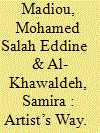

|
|
|
|
|
| Summary/Abstract |
While critics take a particular interest in discussing Mohsin Hamid as a novelist of globalization, migration, war, politics, economics, and capitalism, I contend that Hamid manifests a strong interest in, even obsession with, art in his fiction and non-fiction, which also makes him a novelist of art. Relying on his own words in his non-fiction, I argue that Hamid expresses a direct, often indirect concern about his artistic life, which includes his artistic experiences, ways, pursuits, and struggles in the globalized world of art. This article aims to ground my obstinate claim that Hamid symbolically exposes his own artistic life in his fiction in reality; it does this by focusing on Hamid’s non-fiction where his personal confessions can be said to be the most pronounced in contrast to his fiction where these are symbolic and, therefore, less definite. It establishes the basis on which my subsequent claim that Hamid speaks about his artistic experiences in his fiction can stand and, by extension, the claim that his fiction, besides being metafictional, can also be considered autobiographical.
|
|
|
|
|
|
|
|
|
|
|
|
|
|
|
|
| 2 |
ID:
094830
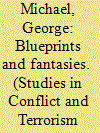

|
|
|
|
|
| Publication |
2010.
|
| Summary/Abstract |
Several novels have attained popularity in the extreme right subculture, most notably, The Turner Diaries-a tale of race war that convulses America. Some observers have characterized these novels as blueprints for revolution and terrorist campaigns. The medium of fiction can be an effective vehicle for propagandizing to those persons who may not be amenable to non-fiction political treatises. This article reviews some of the more popular extremist novels. By doing so, it provides insight into the worldviews and aspirations of the contemporary extreme right.
|
|
|
|
|
|
|
|
|
|
|
|
|
|
|
|
| 3 |
ID:
192196
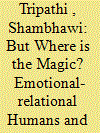

|
|
|
|
|
| Summary/Abstract |
The affective turn in International Relations (IR) has been engaged in the critical project of returning the emotional to the international for a while now. Following these efforts to reinvest humanity in politics, this article seeks to investigate if an engagement with emotional humans can provide refuge from, grapple with and ultimately transform a disenchanted world of IR and spell new worlds into existence that place the emotional-relational at the centre of its practice. Drawing on feminist, aesthetic and decolonial scholarship on emotional-relational humans, I argue that such imaginations can open routes to recovery for emotional worlds in the discipline. I introduce magical realist fiction as a genre of literary writing which embraces the magical ability of humans who resist and transform unbearably rational worlds through their emotional relations with each other. Gleaning moments of emotional incantations by humans–in Isabel Allende’s A Long Petal of the Sea, Salman Rushdie’s Midnight’s Children, and Gabriel Garcia Marquez’s Love in the Time of Cholera–which work to transform a world that becomes too difficult to bear for its inhabitants, I contend that IR stands to gain invaluable lessons by immersing itself in the kind of emotional magic that such literature and its resident humans spell into being.
|
|
|
|
|
|
|
|
|
|
|
|
|
|
|
|
| 4 |
ID:
027805
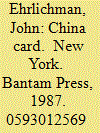

|
|
|
|
|
| Publication |
New York, Bantam Press, 1987.
|
| Description |
523p.Hbk
|
| Standard Number |
0593012569
|
|
|
|
|
|
|
|
|
|
|
|
Copies: C:1/I:0,R:0,Q:0
Circulation
| Accession# | Call# | Current Location | Status | Policy | Location |
| 027365 | 813.54/EHR 027365 | Main | On Shelf | General | |
|
|
|
|
| 5 |
ID:
136288
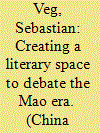

|
|
|
|
|
| Summary/Abstract |
Since the scar literature of the early 1980s, fiction and fictionalised autobiography have played an important role in bringing to light the mass violence of the Cultural Revolution. However, these texts remained within a well-defined framework in which the political system itself was not questioned. Over the last decade, by contrast, the Chinese literary field has focused more specifically on the 1950s, with works such as Yang Xianhui’s Chronicles of Jiabiangou (Tianjin, 2002), and Yang Jisheng’s Tombstone (Hong Kong, 2008). This paper focuses on Yan Lianke’s Four Books (Hong Kong, 2010), a full-fledged fictionalisation in a fantastic mode of the famine of the Great Leap Forward in a village on the Yellow River. Considering literature in the context of theories of the public sphere, it suggests that Yan’s book aims to broaden decisively the discussion on certain previously out-of-bounds aspects of the Mao era, an aim only partially thwarted by its failure to be published within mainland China. Four Books, like Yang Jisheng and Yang Xianhui’s works, thus represents an attempt to call into question the original legitimacy of the PRC polity and to create debate within the Chinese-speaking public sphere on the foundations of the current regime.
|
|
|
|
|
|
|
|
|
|
|
|
|
|
|
|
| 6 |
ID:
096473
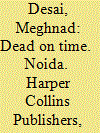

|
|
|
|
|
| Publication |
Noida, Harper Collins Publishers, 2009.
|
| Description |
238p.
|
| Standard Number |
9788172238292, hbk
|
|
|
|
|
|
|
|
|
|
|
|
Copies: C:1/I:0,R:0,Q:0
Circulation
| Accession# | Call# | Current Location | Status | Policy | Location |
| 054980 | 813/DES 054980 | Main | On Shelf | General | |
|
|
|
|
| 7 |
ID:
005387
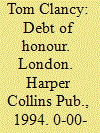

|
|
|
|
|
| Publication |
London, Harper Collins Pub., 1994.
|
| Description |
766p.
|
| Standard Number |
0-00-649253-3
|
|
|
|
|
|
|
|
|
|
|
|
Copies: C:1/I:0,R:0,Q:0
Circulation
| Accession# | Call# | Current Location | Status | Policy | Location |
| 036185 | 813/CLA 036185 | Main | Withdrawn | General | |
|
|
|
|
| 8 |
ID:
120709
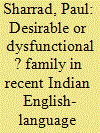

|
|
|
|
|
| Publication |
2013.
|
| Summary/Abstract |
Contemporary Indian English-language fiction marks both a continuous focus on the Indian family as central to society, and also a break from the traditional socialisations of family life. Shifting away from the former calls for reform of marital conventions to accommodate individual needs and many recent novels show families to be dysfunctional sites of domestic violence, incest, extramarital affairs and divorce. Moreover, under the impact of better levels of education, urbanisation and expatriation, the novels of young professional experience tend to portray one's peers as a surrogate family. The idea of family, however, persists.
|
|
|
|
|
|
|
|
|
|
|
|
|
|
|
|
| 9 |
ID:
095225
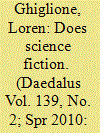

|
|
|
| 10 |
ID:
178516
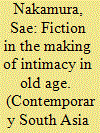

|
|
|
|
|
| Summary/Abstract |
Theoretical debates around the study of ‘kinning’, or emergent intimacies, have usually centred on parent–child relationships, while the later stages of life have largely been ignored. The author suggests that one of the fundamental dilemmas in later-life-kinning lies in the ‘means-ends dichotomy’ and argues that ‘fiction’ may help people to creatively tackle this dichotomy. Ethnographic data were collected from Sri Lanka, where the elderly are prompted to rearrange and/or extend their care relationships, both within and beyond the boundaries of family, against the backdrop of dynamic socio-demographic changes. Evolving in a relatively informal fashion, these activities to rearrange and extend care relationships often involve the direct/indirect mediation of money. Undertaking a detailed case study of an elderly woman, Dorothy, and her caregiver-cum-’kin’ Piyadasa, the author aims to illustrate how fiction enables us to face unfathomable situations or fundamental contradictions – in this case, a means-ends dichotomy. Contrary to the assertion that fiction in the process of kinning can help one define or ‘discover’ a destined, permanent relationship to form a ‘pseudo-biological’ relationship as suggested in previous research on adoption, this paper demonstrates how fiction can help us dwell in uncertainty and gradually reshape our relationships to one another.
|
|
|
|
|
|
|
|
|
|
|
|
|
|
|
|
| 11 |
ID:
100662
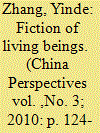

|
|
|
| 12 |
ID:
190716
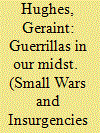

|
|
|
|
|
| Summary/Abstract |
Over the past two decades the historical record of Britain’s wars against a series of insurgencies has experienced a fundamental academic re-assessment, challenging established beliefs about how the British state and its institutions – in particular the British Army – have waged counterinsurgency, and questioning traditional presumptions that Britain fought its insurgent enemies according to a doctrine guided by ‘hearts and minds’ and ‘minimum force’. This article shows that hints about the murky reality behind the ‘British way in counterinsurgency’ can be seen in novels published during the post-war era, some of which used recent conflicts as their subject matter, others of which referred tangentially to previous wars. Not only were these best-selling books with an international audience, but these authors had experience with Britain’s armed forces and intelligence services, and were either directly involved in counterinsurgency conflicts, or their works indicated insight and knowledge about them. Their books provided fictional illustrations of many of the themes – coercive tactics against civilians, special operations against insurgents, inter-departmental disputes, the lack of cultural understanding, the maltreatment of detainees and the excessive use of force against suspected insurgents and civilians – that have been identified and examined by military historians and other academic specialists covering Britain and counterinsurgency.
|
|
|
|
|
|
|
|
|
|
|
|
|
|
|
|
| 13 |
ID:
126044
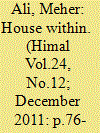

|
|
|
|
|
| Publication |
2011.
|
| Summary/Abstract |
Our car comes to a halt a few metres from a main crossing in Turiaganj, also known as Victoriaganj. At first we cannot locate the house, so we climb up a few flights of stairs to a row of shops. There, a shopkeeper points straight ahead and, opposite us, behind shops packed together like a deck of cards, a haveli rises. From afar, it almost seems like a child's sandcastle, with none of the frills commonly associated with havelis of North India. Instead, it seems to have been inspired by gothic architecture, two towers on either side of the conical façade rising up. Crescent-shaped swirls like half-drawn flowers are engraved on their arches, and perpendicular pillars are topped with football-shaped concrete blocks. A plaque above the arch of the left tower reads 'Adabistan' - the abode of literature. As we enter, the haveli greets us with LIVE AND LET LIVE carved along the roof's boundary wall.
|
|
|
|
|
|
|
|
|
|
|
|
|
|
|
|
| 14 |
ID:
178513
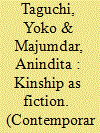

|
|
|
|
|
| Summary/Abstract |
This special issue brings together emerging studies on kinship in South Asia and explores the idea of kinship as ‘fiction’ through ethnographic analysis of intimate relationships. Anthropology had long considered kinship as ‘natural’ or ‘biological’, thereby rendering other relations as ‘real’ or ‘fictive’. However, the recent ever-expanding scope of the ‘new kinship studies’, through the mapping of socio-technological changes, including the development of new reproductive technologies, the expansion of a diverse marriage system, and the global reconfiguration of care work, has brought a new dynamism to the discipline. Drawing both on traditional South Asian kinship studies and on more recent theories in anthropology, care work, medicine and science and technology studies, Kinship as Fiction offers insights on how ‘nature’ and ‘culture’ are related, translated, and regenerate each other by changing their meanings and forms. Fiction plays an important role in shaping reality, by making emerging worlds comprehensible, and helping us to imagine relations differently. This special issue investigates how particular ‘fictions’ are narrated and enacted within the constraints of reality, and how reality is, in turn, generated by fiction in the context of kin and other intimate relationships.
|
|
|
|
|
|
|
|
|
|
|
|
|
|
|
|
| 15 |
ID:
067931
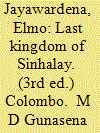

|
|
|
|
|
| Edition |
3rd ed.
|
| Publication |
Colombo, M D Gunasena and Co. Ltd., 2005.
|
| Description |
866p.Pbk
|
| Standard Number |
9552113199
|
|
|
|
|
|
|
|
|
|
|
|
Copies: C:1/I:0,R:0,Q:0
Circulation
| Accession# | Call# | Current Location | Status | Policy | Location |
| 050768 | 828.995493/JAY 050768 | Main | On Shelf | General | |
|
|
|
|
| 16 |
ID:
164745
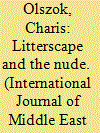

|
|
|
|
|
| Summary/Abstract |
Mansur Bushnaf's al-ʿIlka (Chewing Gum; 2008) is the author's sole novel, born of his twelve-year imprisonment in a Libyan jail, and his reflection on the nation's subjection to international marginalization and dictatorial rule under Gaddafi. The novel is centered on a 19th-century nude which confounds all who encounter it, and which lies neglected in a corner of Tripoli's Red Palace Museum. Through this statue, and the novel's broader poetics of stasis and “chewing,” I explore how turāth in Bushnaf's work, and wider Libyan fiction, is depicted through its abject vulnerability and exposure to historical vicissitudes, reflecting the parallel exclusion of human lives from rights and agency. In al-ʿIlka, I examine how this is formulated into a defamiliarizing perspective on the postmodern, and on historical trauma and erasure, in which the possibility of narrative is a driving concern, rooted in existential reflection, as well as the real precarity of those who tell stories in Libya.
|
|
|
|
|
|
|
|
|
|
|
|
|
|
|
|
| 17 |
ID:
114404
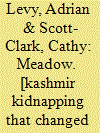

|
|
|
|
|
| Publication |
New Delhi, Penguin Books India Pvt. Ltd., 2012.
|
| Description |
xxvi, 510p.Pbk
|
| Standard Number |
9780143418757
|
|
|
|
|
|
|
|
|
|
|
|
Copies: C:1/I:0,R:0,Q:0
Circulation
| Accession# | Call# | Current Location | Status | Policy | Location |
| 056744 | 808.83/LEV 056744 | Main | On Shelf | General | |
|
|
|
|
| 18 |
ID:
187194
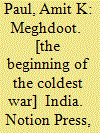

|
|
|
|
|
| Publication |
India, Notion Press, 2022.
|
| Description |
214p.pbk
|
| Standard Number |
9798885304498
|
|
|
|
|
|
|
|
|
|
|
|
Copies: C:1/I:0,R:0,Q:0
Circulation
| Accession# | Call# | Current Location | Status | Policy | Location |
| 060239 | 808.3/PAU 060239 | Main | On Shelf | General | |
|
|
|
|
| 19 |
ID:
122648
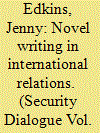

|
|
|
|
|
| Publication |
2013.
|
| Summary/Abstract |
Prompted by Elizabeth Dauphinee's The Politics of Exile, the article explores the political potential of novel ways of writing in international relations. It begins by examining attempts to distinguish between narrative writing and academic writing, fiction and non-fiction, and to give an account of what narrative might be and how it might work. It argues that although distinctions between narrative writing and academic writing cannot hold, there are nevertheless ways of judging the practical political effects that writing can produce. It briefly examines feminist, postcolonial and other international relations scholars who collect other people's stories or tell their own, and points to an instructive body of work in fiction and literary non-fiction beyond the discipline. It argues that writing that disrupts linear forms of temporality and instead inhabits 'trauma time' can open the possibility of an aesthetic political practice, and suggests that we foster such a creative practice in international relations.
|
|
|
|
|
|
|
|
|
|
|
|
|
|
|
|
| 20 |
ID:
125287


|
|
|
|
|
| Publication |
Noida, Random House Publishers India Private Limited, 2010.
|
| Description |
256p.Pbk
|
| Standard Number |
9788184001426
|
|
|
|
|
|
|
|
|
|
|
|
Copies: C:1/I:0,R:0,Q:0
Circulation
| Accession# | Call# | Current Location | Status | Policy | Location |
| 057495 | 808.83/WAG 057495 | Main | On Shelf | General | |
|
|
|
|
|
|
|
|
|